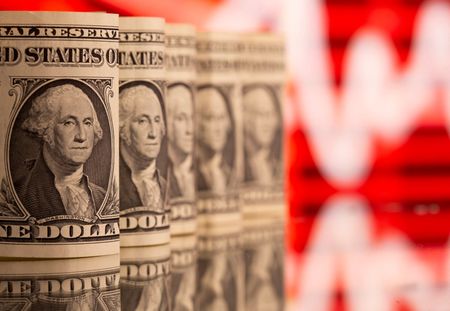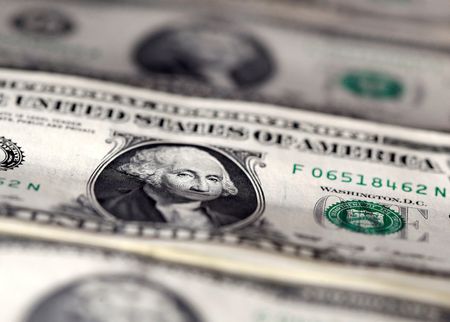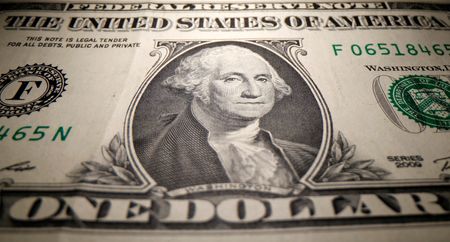By Chuck Mikolajczak
NEW YORK (Reuters) – The dollar retreated on Tuesday, extending declines after a soft reading on U.S. consumer confidence and a drop in U.S. yields weighed, while optimism for more spending in Germany helped lift the euro.
The greenback extended declines after the Conference Board said its consumer confidence index dropped 7 points, its largest fall since August 2021, to 98.3, well short of the 102.5 estimate of economists polled by Reuters.
“The present situation index improved, but consumers are expecting dark skies ahead. Change can be scary, so it’s not surprising that confidence is falling,” said Brian Jacobsen, chief economist at Annex Wealth Management in Menomonee Falls, Wisconsin.
The dollar index, which measures the greenback against a basket of currencies, fell 0.39% to 106.33, just off the two-month low of 106.12 hit on Monday, with the euro up 0.37% at $1.0505.
Concerns have started to emerge about U.S. economic growth, and worries about inflation are growing as tariff deadlines by Trump on Canada and Mexico are set for next week. Investors also fear the labor market impact from actions taken by Elon Musk’s Department of Government Efficiency.
“There’s going to be a lot of back and forth on Trump’s initiatives, and certainly markets in general long term, don’t like tariffs,” said Joseph Trevisani, senior analyst at FXStreet in New York.
“There’s definitely nervousness out there because some of these things could go the wrong way, certainly inflation hasn’t shown any sign of further retreat.”
Richmond Federal Reserve President Tom Barkin said current uncertainty argued for caution and he will follow a wait-and-see approach to central bank policy until it is clear inflation is heading back to the central bank’s 2% target.
Reflecting the defensive tone, the yield on benchmark U.S. 10-year notes fell 8.9 basis points to 4.304% after hitting a 2-1/2 month low of 4.283%.
In addition, the greenback was down 0.44% to 149.05 against the safe haven Japanese yen and off 0.5% to 0.892 against the Swiss franc. The dollar had earlier dropped to a 4-1/2 month low of 148.56 against the yen and touched a nine-week low of 0.8913 against the franc.
After initial signs Germany may be able to move quickly, election winner Friedrich Merz on Tuesday ruled out a rapid reform to Germany’s state borrowing limits known as the “debt brake” and said it was too soon to say whether the outgoing parliament could wave through a massive military spending boost.
U.S. Treasury Secretary Scott Bessent argued on Tuesday the U.S. economy is more fragile under the surface than economic metrics suggest, citing interest rate volatility, sticky inflation and job growth focused on the government sector, while also saying that tariffs are an important source of revenue.
Trump said on Monday that tariffs against Canada and Mexico would proceed as scheduled next week.
The Mexican peso strengthened 0.02% versus the dollar at 20.468 while the Canadian dollar weakened 0.27% versus the greenback to C$1.43.
Analysts at Goldman Sachs noted, “the risk remains that we see a repeat of Trump’s brinkmanship from last month, with choppy price action in those currencies are we approach March 4.”
Sterling strengthened 0.3% to $1.2662.
British Prime Minister Keir Starmer said he would increase annual defense spending to 2.5% of GDP by 2027 and target a 3% level, last seen just after the Cold War, a signal to Trump that Britain can help boost Europe’s security.
In cryptocurrencies, bitcoin plummeted 7.78% to $86,669.58 as tariffs and growth worries dented risk appetite, further denting confidence after last week’s hack of ether from the Bybit exchange.
(Reporting by Chuck Mikolajczak; editing by David Evans and Deepa Babington)









